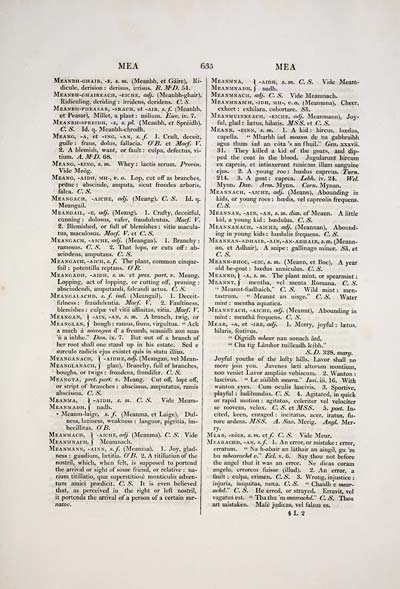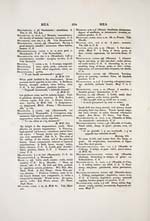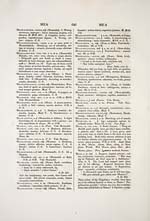Download files
Complete book:
Individual page:
Thumbnail gallery: Grid view | List view

MEA (
Meanbh-ghair, -e, s. m. (Meanbh, et Gàire), Ri-
dicule, derision : derisus, irrisus. R. M'D. 54.
Meanbh-ohaireach, -eiche, adj. (Meanbh-ghair),
Ridiculing, deriding : irridens, deridens. C. S.
Meanbh-pheasar, -srach, et -air, s. f. (Meanbh,
et Peasar), Millet, a plant : milium. Esec. iv. 7.
Meanbh-spreidh, -e, s.pl. (Meanbh, et Spreidh).
C. S. Id. q. Meanbh-chrodh.
Meang, -a, et -iNG, -AN, s.f. 1. Craft, deceit,
guile : fraus, dolus, fallacia. O'B. et Macf. V.
2. A blemish, want, or fault : culpa, defectus, vi-
tium. A. M'D. 68.
Meang, -eing, s. m. Whey : lactis serum. Prwin.
Vide Meog.
Meang, -aidh, mh-, v. a. Lop, cut off as branches,
prilne : abscinde, amputa, sicut frondes arboris,
falca. as.
Meangach, -aiche, adj. (Meang). C. S. Id. q.
Meangail.
Meangail, -e, ad/. (Meang). 1. Crafty, deceitful,
cunning: dolosus, vafer, fraudulentus. 3Iacf. V.
2. Blemished, or full of blemishes : vitio macula-
tus, maculosus. Macf. V. et C. S.
Meangach, -aiche, «4?. (Meangan). 1. Branchy:
ramosus. C. S. 2. That lops, or cuts off: ab-
scindens, amputans. C. S.
Meangach, -aich, s.f. The plant, common cinque-
foil : potentilla reptans. OS.
Meangadh, -aidh, s. m. et pres. part. v. Meang.
Lopping, act of lopping, or cutting off, pruning :
abscindendi, amputandi, falcandi actus. C. S.
Meangalachd, s.f. ind. (Meangail). L Deceit-
fulness : fraudulentia. Macf. V. 2. Faultiness,
blemishes : culpae vel vitii affinitas, vitia. Macf. V.
Meangan, ì -ain, -an, s. m. A branch, twig, or
Meanglan, J bough : ramus, frons, virgultus. " Ach
a mach a meangan d' a freumh, seasaidh aon suas
n a inbhe." Dan. ix. 7. But out of a branch of
her root shall one stand up in his estate. Sed e
surculo radicis ejus existet quis in statu illius.
Meanganach, \ -aidhe, adj. (Meangan, vel Mean-
Meanglanach, J glan). Branchy, full of branches,
boughs, or twigs : frondens, frondifer. C. S.
Meangta, pret.part. v. Meang. Cutoff, lopt off,
or stript of branches : abscissus, amputatus, ramis
abscissus. C. S.
Meanma, i -aidh, s. m. C. S. Vide Meam-
Meanmadh,/ nadh.
• Meanm-laige, s. f. (Meanma, et Laige), Dul-
ness, laziness, weakness : languor, pigritia, im-
becillitas. OB.
Meanmach, 1 -AICHE, odj. (Meanma). C. S. Vide
Meanmnach, J Meamnach.
Meanmann, -ainn, s.f. (Meanma). 1. Joy, glad-
ness : gaudium, laetitia. O'B. 2. A titillation of the
nostril, which, when felt, is supposed to portend
the arrival or sight of some friend, or relative : na-
rium titillatio, quae superstitiosè nionticulis adven-
tum amici praedicit. C. S. It is even believed
that, as perceived in the right or left nostril,
it portends the arrival of a person of a certain sur-
55 MEA
Meanmna, 1 -aidh, s. m. C. S. Vide Meam-
Meanmnadh, J nadh.
Meanmnach, axJj. C. S. Vide Meamnach.
Meanmnaich, -idh, MH-, v.a. (Meanmna), Cheer,
exhort : exhilara, cohortare. Sh.
Meanmuinneach, -eiche, adj. Meanmann), Joy-
ful, glad : laetus, hilaris. MSS. et C. S.
Means, -einn, s. m. 1. A kid : hircus, hoedus,
capella. " Mharbh iad meann de na gabhraibh
agus thum iad an còta 's an fhuil." Gen, xxxvii.
31. Tliey killed a kid of the goats, and dip-
ped the coat in the blood. Jugularunt hircum
ex capreis, et intinxerunt tunicam illam sanguine
ejus. 2. A young roe : hoedus capreus. Turn.
214. 3. A goat: caprea. Lebh. iv. 24. Wei.
Mynn. Dav. Arm. Mynn. Corn. Mynan.
Meannach, -aiche, adj. (Meann), Abounding in
kids, or young roes : hoedis, vel capreolis frequens.
Meannan, -ain, -an, s. m. dim. of Meann. A little
kid, a young kid : hoedulus. C. S.
Meannanach, -aiche, adj. (Meannan), Abound-
ing in young kids : hcedulis frequens. C. S.
Meannan-adhair,-ain,-an-adhair, 5. /«.(Meann-
an, et Adhair), A snipe : gallinago minor. Sh. et
as.
Meann-bhoc, -uic, s. m. (Meann, et Boc), A year
old he-goat : hoedus anniculus. C. S.
Meannd, \ -A, s. m. The plant mint, or spearmint :
Meannt, J mentha, vel menta Romana. C. S.
" Meannt-fiadhaich." C. S. Wild mint : men-
tastrum. " Meannt an uisge." C. S. Water
mint : mentha aquatica.
Meanntach, -aiche, adj. (Meannt), Abounding in
mint : mentha frequens. C. S.
Mear, -a, et -ire, adj. 1. Merry, joyful : Ijetus,
hilaris, festivus.
" Òigridh mkear nan aonach àrd,
" Cha tig Làmhor tuilleadh teibh."
S.jD. 328. tnarff.
Joyful youths of the lofly hills, Lavor shall no
more join you. Juvenes la;ti altorum montium,
non veniet Lavor ampliùs vobiscum. 2. Wanton :
lascivus. " Le sùilibh meara." Isai. iii. 16. With
wanton eyes. Cum oculis lascivis. 3. Sportive,
playful : ludibundus. C. S. 4. Agitated, in quick
or rapid motion : agitatus, celeriter vel velociter
se movens, velox. C. S. et MSS. 5. poet. In-
cited, keen, enraged : incitatus, acer, iratus, fu-
rore ardens. MSS. A. Sax. Merig. Angl. Mer-
MÈAR, -EÒIR, s. m. et/. C. S. Vide Meur.
Mearachd, -an, s.f. 1. An error, or mistake : error,
erratum. " Na h-abair an làthair an aingil, gu 'm
bu mhearachd e." Bel. v. 6. Say thou not before
the angel that it was an error. Ne dicas coram
angelo, errorem fuisse (illud). 2. An error, a
fault : culpa, crimen. C S. 3. Wrong, injustice :
injuria, iniquitas, noxa. C. S. " Chaidh e tnear-
ackd." a S. He erred, or strayed. Erravit, vel
vagatus est. " Tha thu m mearachd." C. S. Thou
art mistaken. Male judicas, vel falsus es.
4L 2
Meanbh-ghair, -e, s. m. (Meanbh, et Gàire), Ri-
dicule, derision : derisus, irrisus. R. M'D. 54.
Meanbh-ohaireach, -eiche, adj. (Meanbh-ghair),
Ridiculing, deriding : irridens, deridens. C. S.
Meanbh-pheasar, -srach, et -air, s. f. (Meanbh,
et Peasar), Millet, a plant : milium. Esec. iv. 7.
Meanbh-spreidh, -e, s.pl. (Meanbh, et Spreidh).
C. S. Id. q. Meanbh-chrodh.
Meang, -a, et -iNG, -AN, s.f. 1. Craft, deceit,
guile : fraus, dolus, fallacia. O'B. et Macf. V.
2. A blemish, want, or fault : culpa, defectus, vi-
tium. A. M'D. 68.
Meang, -eing, s. m. Whey : lactis serum. Prwin.
Vide Meog.
Meang, -aidh, mh-, v. a. Lop, cut off as branches,
prilne : abscinde, amputa, sicut frondes arboris,
falca. as.
Meangach, -aiche, adj. (Meang). C. S. Id. q.
Meangail.
Meangail, -e, ad/. (Meang). 1. Crafty, deceitful,
cunning: dolosus, vafer, fraudulentus. 3Iacf. V.
2. Blemished, or full of blemishes : vitio macula-
tus, maculosus. Macf. V. et C. S.
Meangach, -aiche, «4?. (Meangan). 1. Branchy:
ramosus. C. S. 2. That lops, or cuts off: ab-
scindens, amputans. C. S.
Meangach, -aich, s.f. The plant, common cinque-
foil : potentilla reptans. OS.
Meangadh, -aidh, s. m. et pres. part. v. Meang.
Lopping, act of lopping, or cutting off, pruning :
abscindendi, amputandi, falcandi actus. C. S.
Meangalachd, s.f. ind. (Meangail). L Deceit-
fulness : fraudulentia. Macf. V. 2. Faultiness,
blemishes : culpae vel vitii affinitas, vitia. Macf. V.
Meangan, ì -ain, -an, s. m. A branch, twig, or
Meanglan, J bough : ramus, frons, virgultus. " Ach
a mach a meangan d' a freumh, seasaidh aon suas
n a inbhe." Dan. ix. 7. But out of a branch of
her root shall one stand up in his estate. Sed e
surculo radicis ejus existet quis in statu illius.
Meanganach, \ -aidhe, adj. (Meangan, vel Mean-
Meanglanach, J glan). Branchy, full of branches,
boughs, or twigs : frondens, frondifer. C. S.
Meangta, pret.part. v. Meang. Cutoff, lopt off,
or stript of branches : abscissus, amputatus, ramis
abscissus. C. S.
Meanma, i -aidh, s. m. C. S. Vide Meam-
Meanmadh,/ nadh.
• Meanm-laige, s. f. (Meanma, et Laige), Dul-
ness, laziness, weakness : languor, pigritia, im-
becillitas. OB.
Meanmach, 1 -AICHE, odj. (Meanma). C. S. Vide
Meanmnach, J Meamnach.
Meanmann, -ainn, s.f. (Meanma). 1. Joy, glad-
ness : gaudium, laetitia. O'B. 2. A titillation of the
nostril, which, when felt, is supposed to portend
the arrival or sight of some friend, or relative : na-
rium titillatio, quae superstitiosè nionticulis adven-
tum amici praedicit. C. S. It is even believed
that, as perceived in the right or left nostril,
it portends the arrival of a person of a certain sur-
55 MEA
Meanmna, 1 -aidh, s. m. C. S. Vide Meam-
Meanmnadh, J nadh.
Meanmnach, axJj. C. S. Vide Meamnach.
Meanmnaich, -idh, MH-, v.a. (Meanmna), Cheer,
exhort : exhilara, cohortare. Sh.
Meanmuinneach, -eiche, adj. Meanmann), Joy-
ful, glad : laetus, hilaris. MSS. et C. S.
Means, -einn, s. m. 1. A kid : hircus, hoedus,
capella. " Mharbh iad meann de na gabhraibh
agus thum iad an còta 's an fhuil." Gen, xxxvii.
31. Tliey killed a kid of the goats, and dip-
ped the coat in the blood. Jugularunt hircum
ex capreis, et intinxerunt tunicam illam sanguine
ejus. 2. A young roe : hoedus capreus. Turn.
214. 3. A goat: caprea. Lebh. iv. 24. Wei.
Mynn. Dav. Arm. Mynn. Corn. Mynan.
Meannach, -aiche, adj. (Meann), Abounding in
kids, or young roes : hoedis, vel capreolis frequens.
Meannan, -ain, -an, s. m. dim. of Meann. A little
kid, a young kid : hoedulus. C. S.
Meannanach, -aiche, adj. (Meannan), Abound-
ing in young kids : hcedulis frequens. C. S.
Meannan-adhair,-ain,-an-adhair, 5. /«.(Meann-
an, et Adhair), A snipe : gallinago minor. Sh. et
as.
Meann-bhoc, -uic, s. m. (Meann, et Boc), A year
old he-goat : hoedus anniculus. C. S.
Meannd, \ -A, s. m. The plant mint, or spearmint :
Meannt, J mentha, vel menta Romana. C. S.
" Meannt-fiadhaich." C. S. Wild mint : men-
tastrum. " Meannt an uisge." C. S. Water
mint : mentha aquatica.
Meanntach, -aiche, adj. (Meannt), Abounding in
mint : mentha frequens. C. S.
Mear, -a, et -ire, adj. 1. Merry, joyful : Ijetus,
hilaris, festivus.
" Òigridh mkear nan aonach àrd,
" Cha tig Làmhor tuilleadh teibh."
S.jD. 328. tnarff.
Joyful youths of the lofly hills, Lavor shall no
more join you. Juvenes la;ti altorum montium,
non veniet Lavor ampliùs vobiscum. 2. Wanton :
lascivus. " Le sùilibh meara." Isai. iii. 16. With
wanton eyes. Cum oculis lascivis. 3. Sportive,
playful : ludibundus. C. S. 4. Agitated, in quick
or rapid motion : agitatus, celeriter vel velociter
se movens, velox. C. S. et MSS. 5. poet. In-
cited, keen, enraged : incitatus, acer, iratus, fu-
rore ardens. MSS. A. Sax. Merig. Angl. Mer-
MÈAR, -EÒIR, s. m. et/. C. S. Vide Meur.
Mearachd, -an, s.f. 1. An error, or mistake : error,
erratum. " Na h-abair an làthair an aingil, gu 'm
bu mhearachd e." Bel. v. 6. Say thou not before
the angel that it was an error. Ne dicas coram
angelo, errorem fuisse (illud). 2. An error, a
fault : culpa, crimen. C S. 3. Wrong, injustice :
injuria, iniquitas, noxa. C. S. " Chaidh e tnear-
ackd." a S. He erred, or strayed. Erravit, vel
vagatus est. " Tha thu m mearachd." C. S. Thou
art mistaken. Male judicas, vel falsus es.
4L 2
Set display mode to: Large image | Transcription
Images and transcriptions on this page, including medium image downloads, may be used under the Creative Commons Attribution 4.0 International Licence unless otherwise stated. ![]()
| Early Gaelic Book Collections > Blair Collection > Dictionarium scoto-celticum > Volume I > (705) |
|---|
| Permanent URL | https://digital.nls.uk/76583332 |
|---|
| Description | Lacks half title page in Volume 1. |
|---|---|
| Attribution and copyright: |
|
| Description | A selection of books from a collection of more than 500 titles, mostly on religious and literary topics. Also includes some material dealing with other Celtic languages and societies. Collection created towards the end of the 19th century by Lady Evelyn Stewart Murray. |
|---|
| Description | Selected items from five 'Special and Named Printed Collections'. Includes books in Gaelic and other Celtic languages, works about the Gaels, their languages, literature, culture and history. |
|---|

